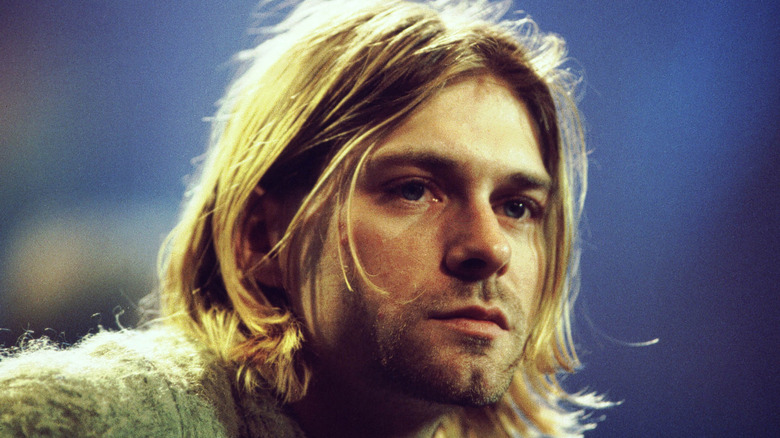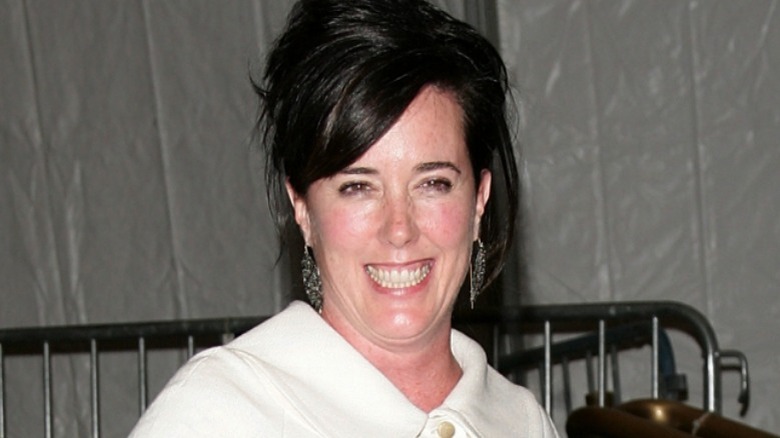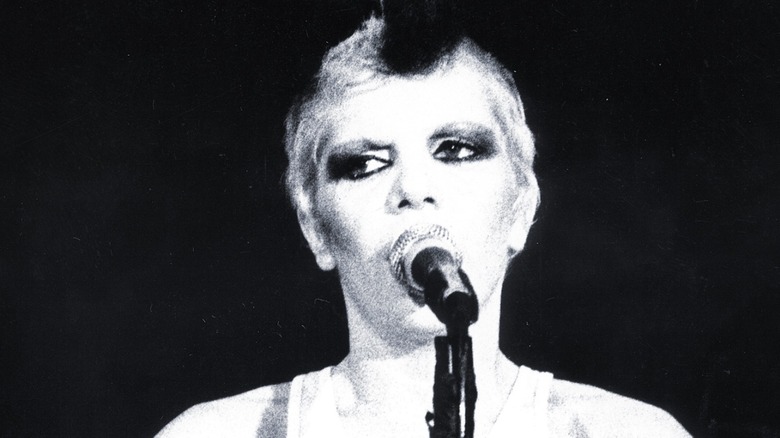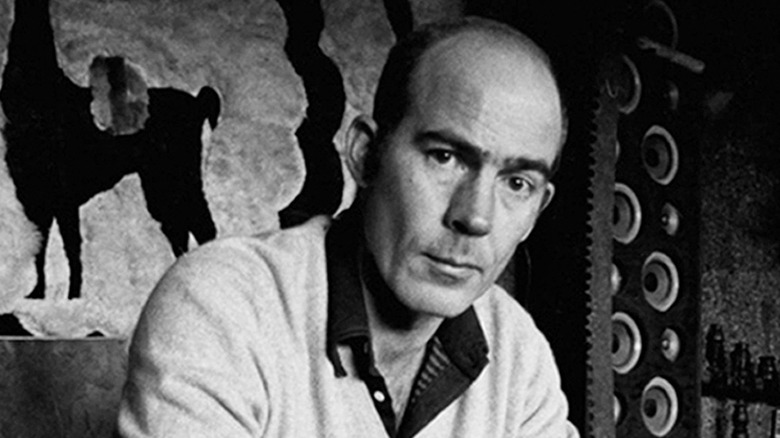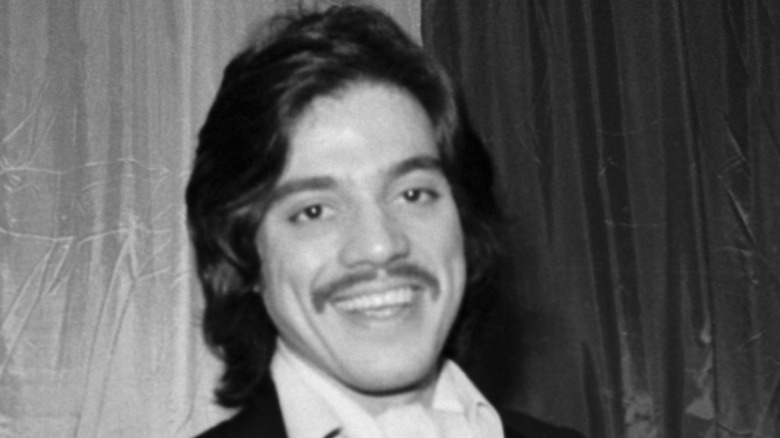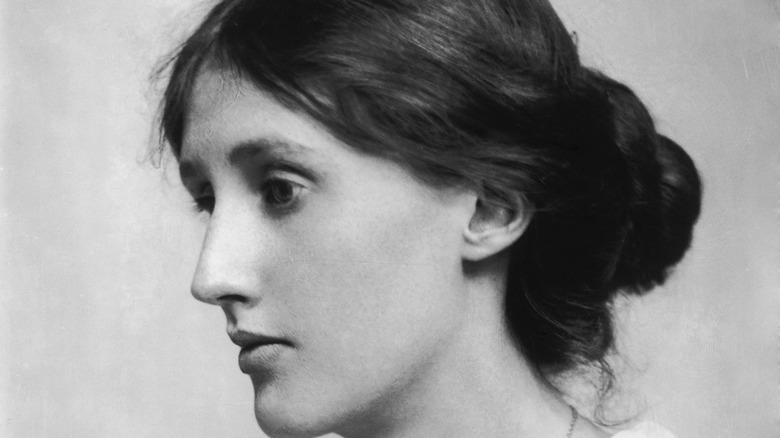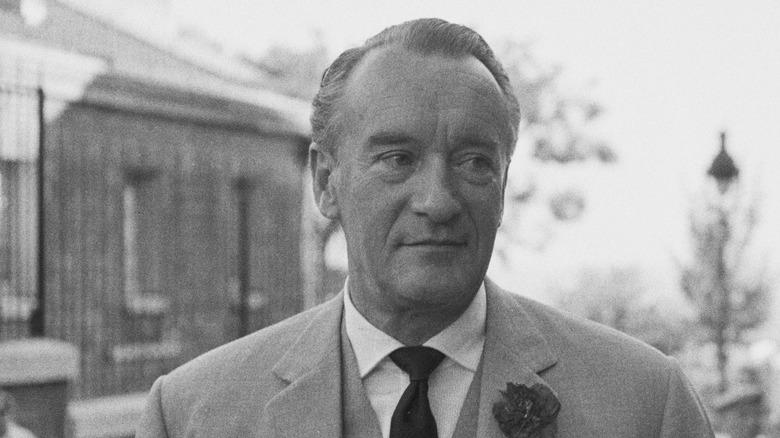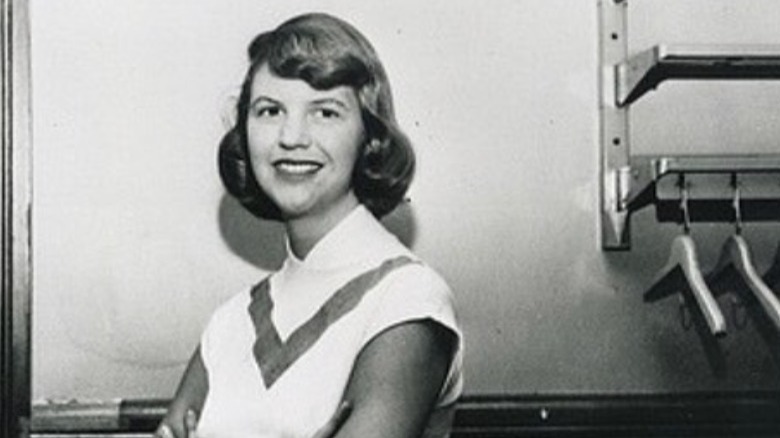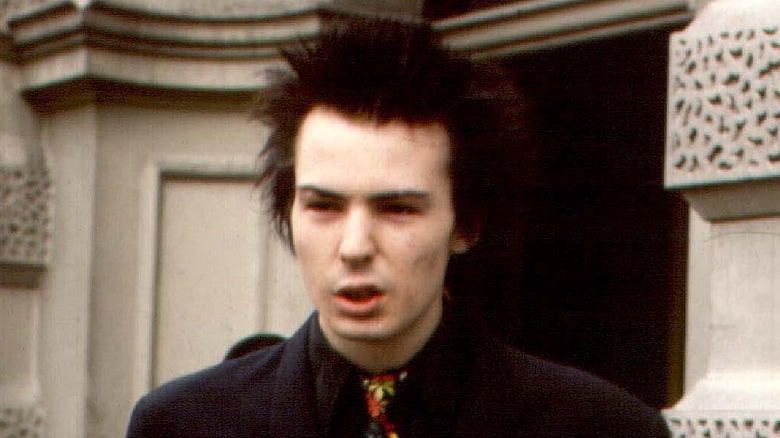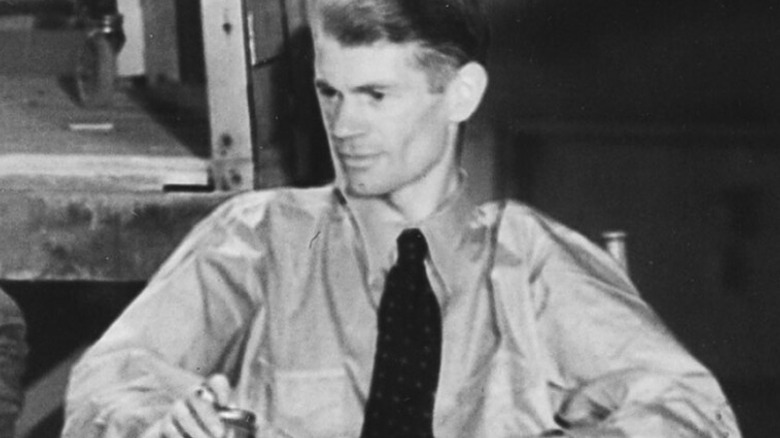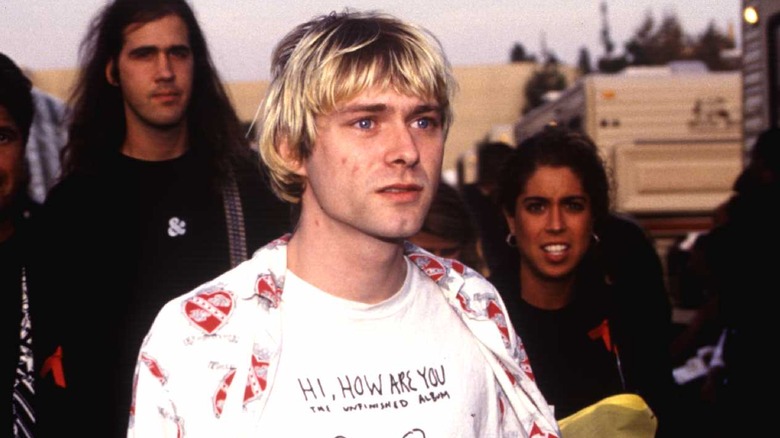The Most Heartbreaking Notes Celebs Left Behind After They Died
We may receive a commission on purchases made from links.
Celebrity deaths are often shocking and always sorrowful. Despite not knowing these people, we feel a connection to them either through their work or their cultural impact – oftentimes both. As the Society for Personality and Social Psychology notes, it's quite normal to feel sadness over the death of a celebrity, citing parasocial connection and heightened awareness of mortality among possible reasons we might mourn the loss of a famous person. And while some celebrity deaths are more publicized than others, each of them is meaningful to someone. Over 60 notable celebrities died in 2022 alone, many of whom made a significant impact on the world in one way or another.
Celebrity deaths are particularly chilling when by suicide. A troubling topic to discuss, it's a horrifying reality that's afflicted even those whose lives we envy, proving fame and fortune doesn't necessarily bring internal peace. When a celebrity dies by suicide, it's further complicated by the public's desire for details. While families often keep details private, sometimes a celebrity's final words are made public, often in the form of a note left behind. These are the most heartbreaking notes celebrities have left behind after they died.
If you or anyone you know is having suicidal thoughts, please call the National Suicide Prevention Lifeline by dialing 988 or by calling 1-800-273-TALK (8255).
Kate Spade left her daughter a note
Kate Spade rose to fame in the early 1990s after designing a line of handbags. Spade's designs became so popular she expanded her offerings to include clothing, jewelry, accessories, and more, and her colorful, whimsical merchandise is still available today. In 2018, news spread that the designer had died by suicide in her Manhattan home, leaving a note to her daughter that read, "Bea – I have always loved you. This is not your fault. Ask Daddy!" as reported by TMZ. The fashion community was shocked by the news, as was the general public. After her death, Spade's family released a statement saying, "We are all devastated by today's tragedy. We loved Kate dearly and will miss her terribly. We would ask that our privacy be respected as we grieve during this very difficult time," per the New York Daily News.
Spade had sold her company over 10 years prior to her death, taking time to focus on raising her daughter instead of her career. When her daughter reached age 12, Spade started a new company, Frances Valentine, along with her husband, first selling shoes and jewelry, as the couple noted in an interview, and eventually offering clothing and handbags.
If you or anyone you know is having suicidal thoughts, please call the National Suicide Prevention Lifeline by dialing 988 or by calling 1-800-273-TALK (8255).
Wendy O. Williams wrote about the ethics of death by suicide in her note
Wendy O. Williams was best known as the lead singer for the punk-rock band, Plasmatics. The band, particularly Williams, developed a controversial reputation for some of its actions, including destroying property and public nudity, all of which Williams proudly owned up to and used as inspiration for music. "Using sex to create the law is so stupid, and I'm not the kind of person who walks the middle of the line. We're not out to pick fights. But then the essence of what we do is shaking up the middle class; I think if you don't do that with your music, you're just adding to the noise pollution," Williams once told Rolling Stone.
The band gained popularity in the early 1980s, and Williams later attempted a solo career before the band recorded one final album together. 10 years after the Plasmatics disbanded, Williams died by suicide. Her longtime partner found her, as well as a package she'd left for him, which contained a note. "I don't believe that people should take their own lives without deep and thoughtful reflection over a considerable period of time. I do believe strongly, however, that the right to do so is one of the most fundamental rights that anyone in a free society should have," the note read, per Rock and Roll Garage.
If you or anyone you know is having suicidal thoughts, please call the National Suicide Prevention Lifeline by dialing 988 or by calling 1-800-273-TALK (8255).
Robin Williams told a makeup artist about his struggles
Though he didn't leave a note, comedian Robin Williams did share a heartbreaking message with a makeup artist just before his death. While filming one of Williams' last movies, "Night at the Museum: Secret of the Tomb," Williams began crying to Cheri Minns. The makeup artist encouraged the actor to perform standup comedy again, to which Williams replied, "I can't, Cheri. I don't know how anymore. I don't know how to be funny," as told by the New York Post. Minns, as well as the rest of the world, would come to find out that Williams had been diagnosed with Lewy body dementia, a form of dementia that "can lead to problems with thinking, movement, behavior, and mood," according to the National Institute on Aging.
Williams was survived by his wife Susan Schnieder Williams, who divulged some of the harrowing moments she and her husband experienced while seeking a diagnosis, noting that he had been subject to some of the aforementioned symptoms, as well as problems with memory and sleep. Williams was initially diagnosed with Parkinson's disease, which has similar symptoms to Lewy body dementia, before receiving a correct diagnosis. "None of the doctors knew that there was this ghost disease underlying all of this. When that was revealed, that was like essentially finding out the name of my husband's killer," Susan told CNN.
If you or anyone you know is having suicidal thoughts, please call the National Suicide Prevention Lifeline by dialing 988 or by calling 1-800-273-TALK (8255).
Hunter S. Thompson wrote to himself
Fans of Gonzo journalism have Hunter S. Thompson to thank for the shift in accepted reporting styles. What is now a studied and sought-after form of journalism was once a new-fangled idea, one that was ushered in by Thompson through seminal works like "Hell's Angels: A Strange and Terrible Saga" and "Fear and Loathing in Las Vegas: A Savage Journey to the Heart of the American Dream." Thompson is as important a literary figure as Sylvia Plath or F. Scott Fitzgerald, his legacy perhaps more relevant to everyday life than either author's.
Though Thompson's most celebrated work was written and published in the '70s, '80s, and '90s, the journalist continued writing into the '00s, his death coming just five years into the decade. Thompson died by suicide in February 2005, and he left his wife, Anita Bejmuk, a note titled "Football Season is Over," a reference to the ennui he felt every year after the Super Bowl. "No More Games. No More Bombs. No More Walking. No More Fun. No More Swimming. 67. That is 17 years past 50. 17 more than I needed or wanted. Boring. I am always b****y. No Fun – for anybody. 67. You are getting Greedy. Act your old age. Relax – This won't hurt," the note read, as reported by Rolling Stone. Thompson's loved ones gathered at his home six months later to memorialize the writer.
If you or anyone you know is having suicidal thoughts, please call the National Suicide Prevention Lifeline by dialing 988 or by calling 1-800-273-TALK (8255).
Freddie Prinze said he would be at peace
A tragic reality, many of the world's most famous comedians have shared they are plagued by mental health issues, such as depression and anxiety. A worse reality, many comedians have died by suicide, leading many to wonder why some of the funniest people are also the saddest. "Isolation, long periods of traveling without a support system, and crazy-easy access to drugs and booze. As with all true artists, we feel too much," comedian Jim Mendrinos suggested to Forbes as a reason. "It's really hard to be 'ON' all the time. We struggle with our onstage persona and our personal lives," comedian Jenny Saldana added.
Whatever the reason may be, it seems to be a pervasive issue, one that's long affected some of our most esteemed comedians, like Freddie Prinze, who died by suicide in 1977. The actor was taken to the hospital after sustaining wounds from the incident, but the efforts to save his life were unsuccessful. Per the New York Daily News, Prinze left a note that read, "I can't take it any more." Prinze was survived by his estranged wife, as well as his 10-month-old son, Freddie Prinze Jr., who went on to have a successful acting career of his own.
If you or anyone you know is having suicidal thoughts, please call the National Suicide Prevention Lifeline by dialing 988 or by calling 1-800-273-TALK (8255).
Virginia Woolf detailed the issues she was facing internally
Creatives of all kinds – not just comedians – are more apt to suffer from mental illness. And this isn't just an observation, it's been studied by medical researchers at length. As the National Library of Medicine points out, many of these studies have been conducted using writers as the test group. One famous writer who suffered from a variety of mental health issues was Virginia Woolf, author of works like "Mrs. Dalloway" and "To the Lighthouse." Per the National Library of Medicine, Woolf reportedly had bipolar disorder, which is "a mental health condition that causes extreme mood swings that include emotional highs (mania or hypomania) and lows (depression)," per the Mayo Clinic.
In 1941, Woolf died by suicide. The author left behind a hand-written note, and it detailed part of what Woolf was experiencing internally. Per Open Culture, Woolf's note read, "I feel certain I am going mad again. I feel we can't go through another of those terrible times. And I shan't recover this time. I begin to hear voices, and I can't concentrate." Woolf's death came shortly after she finished "Between the Acts," and her note also heartbreakingly said, "I am doing what seems the best thing to do."
If you or anyone you know is having suicidal thoughts, please call the National Suicide Prevention Lifeline by dialing 988 or by calling 1-800-273-TALK (8255).
George Sanders said he was bored
A prolific actor, George Sanders had a career and life many dream of, full of awards, iconic roles, and a higher-than-average number of wives. Born in Russia, Sanders won an Oscar for his role in "All About Eve" in 1950, and he voiced Shere Kahn the Tiger in "The Jungle Book" in 1967, making him part of millions of people's childhoods for decades to come. Sanders was married four separate times to four separate women, but the women only came from three separate families. Two of his wives, Zsa Zsa Gabor and Magda Gabor, were sisters.
After years in the entertainment industry, Sanders died by suicide in 1972. The actor was 65 and not married at the time of his death. Ever one to make history, Sanders left behind a tragic note that caught many, many people's attention. "Dear World, I am leaving because I am bored," the actor wrote, per Trove. "I feel I have lived long enough. I am leaving you with your worries in this sweet cesspool – good luck," he added. Sanders wrote a second note in Spanish, which included instructions to use the cash he left in his pocket to pay for the hotel where he was staying and his funeral.
If you or anyone you know is having suicidal thoughts, please call the National Suicide Prevention Lifeline by dialing 988 or by calling 1-800-273-TALK (8255).
Sylvia Plath left a message urging someone to call the doctor
Writer Sylvia Plath made history for her literary works. An illustrious poet, Plath also wrote "The Bell Jar," a novel that was based party on her own life. In the novel, Plath proved to be an excellent writer, but the content was particularly noteworthy, the author penning her experience with mental health and detailing a depressive episode for which she sought in-patient treatment. Per the National Library of Medicine, Plath was diagnosed with depression when she was 20 years old. Just over 10 years later, she died by suicide at her London home.
While some have left very detailed notes to friends and family in the wake of their death, others, like Plath, left succinct notes, leading many to debate the intention of the message. Per Literary Ladies Guide, Plath's note read, "Please call Dr. Horder," and it included the number to call, many students of her death convinced the message was a call for help rather than a signal of intention. Plath had been actively working with Dr. Horder to treat her depression, and as the outlet notes, Dianne Middleton, author of "Her Husband: Ted Hughes and Sylvia Plath – A Marriage," wrote that Dr. Horder believed Plath intended to die, though her mental health had been showing signs of improvement.
If you or anyone you know is having suicidal thoughts, please call the National Suicide Prevention Lifeline by dialing 988 or by calling 1-800-273-TALK (8255).
Sid Vicious left burial instructions
Sex Pistols bassist Sid Vicious was known for embodying the classic trio of vices sex, drugs, and rock and roll. Per Far Out, Vicious was once quoted saying, "I'll die before I'm 25, and when I do, I'll have lived the way I wanted to." The apparently prescient guitar player joined the band in his early twenties, and nearly a year after he joined, in 1978, he toured the United States with the group. The next year, Vicious died by suicide, leaving behind a note that read, "We had a death pact. I have to keep my half of the bargain. Please bury me next to my baby. Bury me in my leather jacket, jeans and motor cycle boots. Goodbye."
The "death pact" was seemingly in reference to Nancy Spungen, Vicious's girlfriend who was found dead in the hotel room she shared with Vicious months before his own death. Authorities charged Vicious with second-degree murder, and after spending time in a psychiatric ward due to a suicide attempt, as well as serving time at Riker's Island, Vicious died, reportedly once saying, "I want to join Nancy and keep up my end of the pact." Vicious and Spungen's relationship was allegedly tumultuous, and their love story inspired the film "Sid and Nancy."
If you or anyone you know is having suicidal thoughts, please call the National Suicide Prevention Lifeline by dialing 988 or by calling 1-800-273-TALK (8255).
James Whale asked for forgiveness in the note he left behind
Those who are unfamiliar with James Whale are certainly familiar with his work. The filmmaker is responsible for directing iconic movies such as "The Invisible Man," "Show Boat," "Frankenstein," and "The Bride of Frankenstein." Though Whale's career was quite fruitful, it was cut short due to his death in 1957. Per the Chicago Tribune, Whale was found at the bottom of his private pool. A note was left by the pool, reading, "I have had a wonderful life but it is over, and my nerves get worse and I am afraid they will have to take me away. So please forgive me, all those I love and may God forgive me too, but I cannot bear the agony and it's best for everyone this way," adding that he was in pain unless he was taking medication.
While Whale's friends and family members were made aware of the note he left, the general public did not know of its existence until many years later when James Curtis wrote Whale's biography, "James Whale: A New World of Gods and Monsters." Per The Los Angeles Times, up until the release of Curtis' book, it was widely suspected that Whale's death might have been a murder. The suspicions were put to rest when Curtis printed Whale's note.
If you or anyone you know is having suicidal thoughts, please call the National Suicide Prevention Lifeline by dialing 988 or by calling 1-800-273-TALK (8255).
Kurt Cobain quoted a song
When Nirvana released "Smells Like Teen Spirit," the world experienced a cultural shift. The band, led by frontman Kurt Cobain, recorded arguably the best grunge music of all time, changing the pop music landscape for years to come. With its success came unprecedented fame, an experience Cobain had commented on just months before his death. "I still see stuff, descriptions of rock stars in some magazine — [...] 'Kurt Cobain, the whiny, complaining, neurotic, bitchy guy who hates everything, hates rock stardom, hates his life.' And I've never been happier in my life [...] I'm a much happier guy than a lot of people think I am," he told Rolling Stone in an interview published on January 27, 1994.
On April 5, 1994, Cobain died by suicide, leaving behind his wife, Courtney Love, and his daughter. Prior to his death, Cobain suffered from chronic stomach pain, an affliction he treated himself through heroin use. Though he quit using heroin for a time just before his death, both that and Valium were in his system when he died. Cobain was found at his Seattle, Washington home with a note that quoted Neil Young's song "My My, Hey Hey (Out of the Blue). "Better to burn out than to fade away," the heartbreaking note read. Cobain's death was mourned by the entire world, and his tremendous musical legacy lives on today.
If you or anyone you know is having suicidal thoughts, please call the National Suicide Prevention Lifeline by dialing 988 or by calling 1-800-273-TALK (8255).

